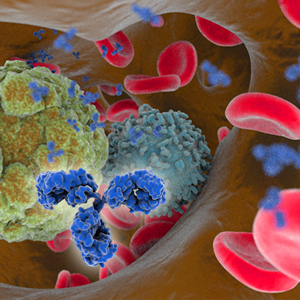 Mogamulizumab (KW-0761, Poteligeo®), is an IgG1 afucosylated humanized monoclonal antibody targeting CC chemokine receptor 4 (CCR4) expressed on tumor cells of patients with cutaneous T-cell leukemia lymphoma (CTCL), including mycosis fungoides and Sézary syndrome. Afucosylation enhances the antibody-dependent cell-mediated cytotoxicity (ADCC) activity of the mAb. Mogamulizumab was initially approved in Japan in March 2012 for the treatment of patients with relapsed or refractory CCR4-positive adult T-cell leukemia-lymphoma (ATL), and then granted marketing authorization in Japan for the treatment of patients with relapsed or refractory CCR4-positive, peripheral T-cell lymphoma (PTCL) and CTCL in March 2014, and with chemotherapy-naive CCR4-positive ATL in December 2014.
Mogamulizumab (KW-0761, Poteligeo®), is an IgG1 afucosylated humanized monoclonal antibody targeting CC chemokine receptor 4 (CCR4) expressed on tumor cells of patients with cutaneous T-cell leukemia lymphoma (CTCL), including mycosis fungoides and Sézary syndrome. Afucosylation enhances the antibody-dependent cell-mediated cytotoxicity (ADCC) activity of the mAb. Mogamulizumab was initially approved in Japan in March 2012 for the treatment of patients with relapsed or refractory CCR4-positive adult T-cell leukemia-lymphoma (ATL), and then granted marketing authorization in Japan for the treatment of patients with relapsed or refractory CCR4-positive, peripheral T-cell lymphoma (PTCL) and CTCL in March 2014, and with chemotherapy-naive CCR4-positive ATL in December 2014.
In October 2017, Kyowa Hakko Kirin announced that a marketing authorization application (MAA) for mogamulizumab, for the treatment of CTCL in adults who have received at least one prior systemic therapy, is under review at the European Medicines Agency. The MAA includes data from the randomized, open-label, multi-center Phase 3 MAVORIC study (NCT01728805), which evaluated the effects of mogamulizumab versus vorinostat (Zolinza®) in patients with refractory cutaneous T cell lymphoma who failed previous treatment. The study included 372 patients who were randomized to receive either mogamulizumab (1.0 mg/kg weekly x 4 in cycle 1, then every other week until progression) or vorinostat (400 mg orally daily). The primary outcome measure of the study was progression-free survival (PFS), with the target being a 50% improvement over the reference median PFS for vorinostat (median PFS of 254 days for the mogamulizumab arm versus 169 days for the vorinostat arm). In April 2017, Kyowa Hakko Kirin announced top-line results from the MAVORIC study indicating the primary endpoint of PFS had been met. In August 2017, mogamulizumab received breakthrough therapy designation in the US for mycosis fungoides and Sézary syndrome based on results from the MAVORIC study.
The Antibody Society maintains a comprehensive table of approved antibody therapeutics and those in regulatory review in the EU or US. As of November 10, 2017, marketing applications for a total of 11 antibody therapeutics that have not yet been approved in either the EU or US are undergoing review in these regions.
Please log in to access the table, located in the Members Only section.
Not a member? Please join!
Membership is free for students and employees of the Society’s corporate sponsors.





